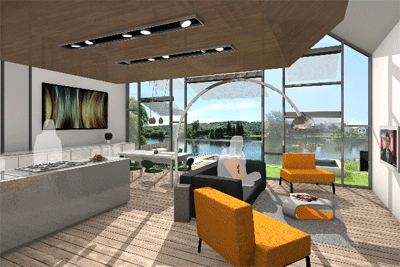Thames-side property: UK's first amphibious house
A house which is able to rise with the water level will be built on the banks of the Thames later this year, while the planning permission granted sets a precent for new properties built in areas prone to flooding

Planning permission has been granted to build the UK's first amphibious house. Once built, it will rest on the ground on fixed foundations but whenever a flood occurs the entire building will rise up in its dock and float, buoyed by the floodwater.
The design will use the latest technology and is a major breakthrough for British architects and engineers who have been searching for many years for a solution to mitigate the risk and damage of water entering homes in flood-prone areas.
London-based Baca Architects have drawn up designs for a modern, eco-friendly 225sqm house - set just 10m from the river's edge - which will replace a dilapidated bungalow. It will be located on an island in the stretch of the Thames that passes through Marlow in Buckinghamshre. The house has been designed to be sympathetic to the local area and will have pitched roofs and a chimney.

* Subscribe to Country Life and save over £50 a year
The garden will act as a natural early warning flood system, with terraces set at different levels designed to flood incrementally and alert the occupants well before the water reaches a threatening level. The lowest terrace will be planted with reeds, another with shrubs and plants, another will be lawn and the highest step will be a patio with access into the dining room. These stepped levels will help to manage run-off from the house as the water begins to subside and also reduce siltation of the dock.
The upper part of the house is a lightweight timber construction that rests on a concrete hull, creating a free-floating pontoon, while the whole house is set between four ‘dolphins' - permanent vertical guideposts to keep it in place. These guideposts, more normally found on marinas, have been integrated with the design and are a visible feature on the exterior of the building.
Watch the video here:
Sign up for the Country Life Newsletter
Exquisite houses, the beauty of Nature, and how to get the most from your life, straight to your inbox.
'The planning process obviously took a bit more time than some applications, involving our team in extensive consultations and cooperation with the local authority,' explains director of Baca Architects Richard Coutts. 'From the outset of the design process we sought expert advice from the Environment Agency to determine the most appropriate construction model to mitigate flood risk on the site and provide a safe dwelling, sympathetic to its setting, and fit for the challenges of the 21st century. The EA supported our proposal because it was a replacement dwelling so flood risk was reduced on this site.'
Building an amphibious home currently costs around 20% to 25% more than a similar sized house.
* Follow us on Twitter
-
 Spam: The tinned meaty treat that brought a taste of the ‘hot-dog life of Hollywood’ to war-weary Britain
Spam: The tinned meaty treat that brought a taste of the ‘hot-dog life of Hollywood’ to war-weary BritainCourtesy of our ‘special relationship’ with the US, Spam was a culinary phenomenon, says Mary Greene. So much so that in 1944, London’s Simpson’s, renowned for its roast beef, was offering creamed Spam casserole instead.
By Mary Greene Published
-
 Folio, Folio, wherefore art thou Folio? Shakespeare set to be auctioned by Sotheby's
Folio, Folio, wherefore art thou Folio? Shakespeare set to be auctioned by Sotheby'sFour Folios will be auctioned in London on May 23, with an estimate of £3.5–£4.5 million for 'the most significant publication in the history of English literature'.
By Lotte Brundle Published
